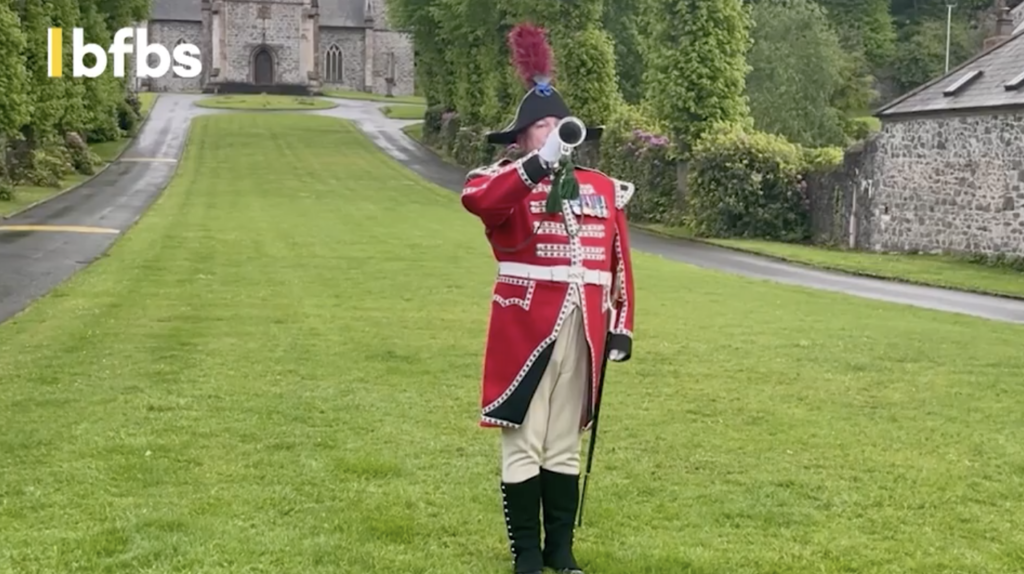British Army veteran’s new bugle call to celebrate Queen’s Platinum Jubilee

Andrew Carlisle’s ‘Majesty’ will herald the lighting of beacons across the Commonwealth. Play video
A British Army veteran has composed a new bugle call that will be played as beacons are lit in all 54 capital cities of the Commonwealth to mark the start of Her Majesty the Queen’s Platinum Jubilee celebrations.
Andrew Carlisle, the Bugler of the Hillsborough Fort Guard in County Down and a former soldier in the Royal Irish Regiment Home Service, created the bugle call ‘Majesty’ by request of the Queen’s Pageantmaster.
Pageantmaster Bruno Peek called Andrew and asked if he would compose a fanfare that would herald the lighting of the Platinum Jubilee beacons across the Commonwealth – the first community event of the four-day Jubilee weekend – on 2 June.
At first, Andrew thought it was a prank call, saying: “To be honest, I actually thought it was a joke at the start.
“I thought it was some of the other guys messing around but no, it was genuine enough, so I set to work and banded a few ideas around.”
- Veteran bugler nears ‘Last Post’ world record
- Wilfred Owen bugle played in Scotland for the first time
- Commanding Officer’s silver bugle competition
The call of the bugle is one of the most distinctive sounds in military music and its haunting notes are often heard across the world during Remembrance.
The last post has a special place in the national consciousness.
While its days of being used by troops to communicate during battles are long gone, many service personnel keep the military tradition alive in their day-to-day service.
The honour of playing the bugle is one of the most sought after among Armed Forces musicians.

The Majesty bugle call was performed publicly for the first time this week in the shadow of Royal Hillsborough’s War Memorial in County Down. Fiona Cameron, Station Manager at BFBS the Forces Station in Northern Ireland, was among the first to hear its debut in a public space and asked Andrew about the making of the bugle call.
Speaking about the brief for writing the call, he said he was asked: “to keep it simple, to encourage school children and people of mixed ability to be able to join in and feel part of this historic occasion.”
The British Army veteran explained that due to the small number of notes a bugle can make, it is difficult to compose something unique. And to add to the difficulty, this was the first time Andrew had written music, saying: “I’ve never actually composed anything before so [it’s] my debut to the world stage.
“I think you have to have a bit of a tune in your head and as I say, you’ve only got a few notes to play with and it’s how you space those notes out and you want to try and make it sound a bit regal and have a bit of presence to announce the actual occasion.
“It’s a sort of trial-and-error thing.”
Andrew says that naming the bugle call was harder than writing it because he was keen not to make it sound “corny and too direct”.
He chose ‘Majesty’ because he believes the name suggests how the piece of music should be played and who it is being played for. Andrew also wanted to mark how The Queen “has reigned over her 70 years with grace and majesty”.
Speaking about the finished piece, he said: “I’m pleased with how it came out.
“I’m encouraged whenever I go on to the Platinum Jubilee beacons webpage and read all the places across the globe where it’s going to be played.”
Cover image: Andrew Carlisle is the composer of ‘Majesty’ (Picture: BFBS).
